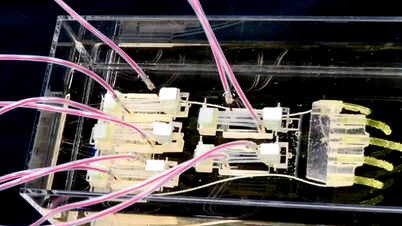Bach Mai Hospital performs 800 to 1,000 gastrointestinal endoscopy procedures every day, with the most lesions detected in the colon, stomach, and esophagus.
The information was announced by Associate Professor, Dr. Nguyen Cong Long, Director of the Center for Hepatobiliary Gastroenterology, Bach Mai Hospital, at the 8th Gastroenterology Scientific Conference of Bach Mai Hospital - Nagoya University, Japan, on October 14. This is an opportunity for experts to exchange experiences in diagnosing and treating diseases of the pancreaticobiliary tract.
The upper digestive tract includes the mouth, esophagus, stomach, pancreas, liver, bile ducts, and small intestine. Disorders such as difficulty swallowing, bloating, indigestion, gastric reflux, abdominal pain, dry hematemesis, and prolonged vomiting of blood, accompanied by fatigue and weight loss, warn of the possibility of cancer. The lower digestive tract includes the colon, rectum, and anus. Phenomena such as prolonged constipation or diarrhea, and bloody stools are warning signs.
Gastrointestinal cancer is one of the most common cancers in Vietnam. At Bach Mai Hospital, about 1,000 gastrointestinal endoscopy procedures are performed every day, with the most lesions detected in the colon, stomach, and esophagus.
According to the World Cancer Organization (Globacan 2020), in Vietnam, each year there are more than 17,000 new cases of stomach cancer; 14,000 cases of colon cancer; 3,200 cases of esophageal cancer. However, the number of early cancer cases in our country is very small, most of which are still detected late.
"While Japan detects about 20,000 cases of early stomach cancer each year, in our country there are only a few thousand. At Bach Mai Hospital, about 20 cases are detected in the early stages each week," Associate Professor Long said, adding that in the early stages, doctors only need to cut under the mucosa through endoscopy, while in the later stages, surgery can be performed.
Signs of gastrointestinal cancer are easily confused with other diseases of the digestive tract. Therefore, when there are problems, patients need to see a specialist immediately, or screen for gastrointestinal cancer at an early stage such as doing blood tests, ultrasound, X-ray, endoscopy, PET/CT scan as prescribed by doctors.

Associate Professor, Dr. Nguyen Cong Long, Director of the Center for Digestive and Hepatobiliary Diseases, shared at the conference. Photo: Le Nga
Early stage gastrointestinal cancer can be cured by many advanced methods such as surgery, radiotherapy, chemotherapy, and gastrointestinal mucosal resection without surgical removal. Screening, early detection and diagnosis along with treatment regimens will help patients have the opportunity to prolong life and have a high chance of recovery.
In Japan, thanks to early diagnosis, detection, and treatment of gastrointestinal cancers, the chance of cure is high, and life expectancy is almost normal. High-risk groups for gastrointestinal diseases include age, smoking, heavy drinking, and people with a family history of stomach and colon cancer.
"A person who is addicted to both drugs and drinks a lot of alcohol has a very high risk of developing digestive tract cancer, especially esophageal cancer," said Associate Professor Long.
Some countries recommend that women should be screened for gastrointestinal diseases from 45 years old and men from 50 years old. In addition, it is necessary to base on risk factors to determine when screening is needed and how often.
Le Nga
Source link























![[Photo] Signing of cooperation between ministries, branches and localities of Vietnam and Senegal](https://vphoto.vietnam.vn/thumb/1200x675/vietnam/resource/IMAGE/2025/7/24/6147c654b0ae4f2793188e982e272651)
















































































Comment (0)